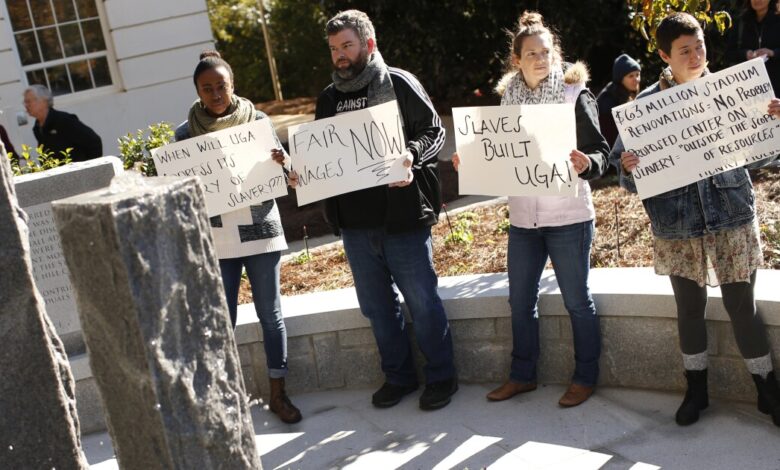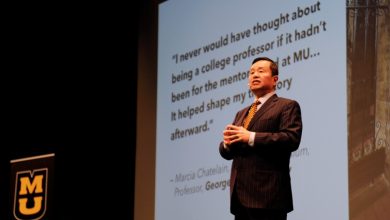Georgia’s Campuses Will Continue to Honor People Who Had Ties to Slavery and Racism

With little explanation, the Board of Regents for the University System of Georgia has entirely rejected an advisory committee’s recommended changes to the names of buildings on the system’s 26 campuses.
The committee was appointed by the regents in June 2020 as a response to the nationwide demands for racial justice. It issued a 180-page report to the regents in June, calling for a small percentage of buildings to be renamed or provided with more historical context while keeping the name.
“History can teach us important lessons,” said a news announcement from the system on Monday, “lessons that if understood and applied make Georgia and its people stronger. The Board, therefore, will not pursue name changes on USG buildings and colleges as recommended by the advisory group’s report,” said the statement from the Regents. System officials did not make anyone available for further comment.
The decision in Georgia is another example, activists say, of higher-education leaders paying lip service to racial justice while failing to carry out even basic symbolic actions to support that cause.
A similar situation has played out at the University of South Carolina, where a commission recommended removing the names from 11 campus buildings that honor people who held racist views. Instead, the university’s interim president, Harris Pastides, and other officials had predetermined not to take any action on those recommendations long before they were issued.
Janet E. Frick, an associate professor of psychology at the University of Georgia, said the only surprise about the regents’ announcement was that they didn’t wait until the evening before the Thanksgiving holiday to try to bury the news of their decision.
From the time the advisory committee was announced, Frick said, it was clear the regents were not interested in taking action that might upset conservative politicians. “There was no indication that this was ever a big priority,” she said.
I saw this coming when they assigned this to a committee rather than taking direct action.
Mariah Parker, a doctoral student in language and literacy at the University of Georgia and an elected commissioner for Athens-Clarke County, said the regents’ inaction is just another way the system “tries to run from its legacy of white supremacy.”
“I saw this coming when they assigned this to a committee,” she said, “rather than taking direct action.”
‘It’s Sad’
Like scores of universities across the country, the regents at the University System of Georgia formed the committee in response to the nationwide eruption of protests for racial justice after a Minneapolis police officer murdered George Floyd.
The committee’s goal was to ensure that the names of buildings represent “the very best of our state and 333,000 students,” the chairman of the regents, Sachin Shailendra, had said in a news release at the time.
The system’s chancellor, Steve Wrigley, had said the committee was setting out to provide education and context. The university system’s “mission is knowledge, and this action today is a step toward addressing how communities understand the history and context involving our campuses,” Wrigley had said as the panel began its work.
After a year, the advisory panel issued a 180-page report that recommended removing the names of 75 buildings, less than 2 percent of all the structures considered. The committee also recommended adding historical information for another 21 building names on system campuses.
Although the regents opted not to follow the panel’s guidance, they said in a statement they were “grateful to Albany State University President Marion Fedrick and the members of the naming advisory group for their diligent work on this complex matter.”
Fedrick, the advisory committee’s chair, did not respond to a request for comment. Other members of the committee declined to comment.
The regents’ inaction demonstrates how shallow their true commitment to the committee and its findings really were, Susan Mattern, a research professor of history at the University of Georgia, said in an email.
“It’s sad,” Mattern wrote, that the university system “claims to support diversity, equality and inclusiveness, but can’t even rename some buildings. That sends a strong message about the depth of our commitment to those values.”
To students of color, the racist history of the system’s campuses is obvious even in walking across campus, said Parker, the doctoral student. For example, the library named for Richard B. Russell, the longtime U.S. senator, who died in 1971, is “a living specter of what these people stood for.”
Russell “publicly promoted ideas of white supremacy and worked to maintain racial segregation,” according to the advisory committee’s findings.
Parker said she is now focused on other issues, like trying to get better wages for the mostly African American laborers and staff members who work on the university campus, and reparations for families who were displaced from Linnentown in the 1960s, when the city of Athens took their homes through eminent domain to build dormitories.
But the struggle to achieve those ends feels much harder if the system can’t even make symbolic changes such as renaming buildings, Parker said.
“I guess I have my fights picked with the university.”
Source link






